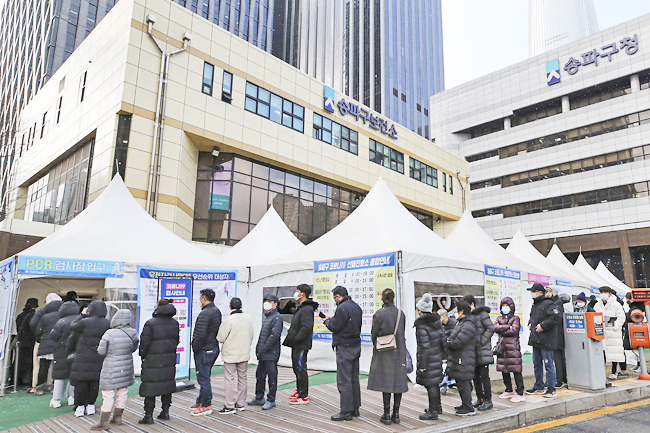SEOUL, SOUTH KOREA (AP) – South Korea will distribute free coronavirus rapid test kits at schools and senior care facilities starting next week as it weathers an unprecedented wave of infections driven by the fast-moving Omicron variant.
Health officials yesterday reported its highest daily jump in coronavirus infections with 90,443 new cases, shattering the previous one-day record set on Tuesday by more than 33,000 cases. Some experts said the country could see daily cases of around 200,000 in March.
While Omicron has so far seemed less likely to cause serious illness or death compared to the Delta variant, which rattled the country in December and early January, hospitalisations have been creeping up amid the greater scale of outbreak.
Prime Minister Kim Boo-kyum, Seoul’s No 2 official behind President Moon Jae-in, said officials will start distributing free rapid test kits next week at kindergartens, elementary schools and senior care facilities, including nursing homes and neighbourhood welfare centres, to strengthen protection for unvaccinated children and high-risk groups.
Education Minister Yoo Eun-hye said schools will be getting enough kits for students to use twice a week, but added that such tests won’t be mandatory.

“We ask for students to be tested at home with the rapid antigen test kits on the evenings of Sunday and Wednesday before coming to school,” Yoo said during a briefing. “When testing positive from those tests, please visit the local health office to get PCR (lab) tests.”
The fast-developing Omicron surge has left officials debating whether the country should maintain strict social distancing rules, including a six-person limit on private social gatherings and a 9pm curfew for restaurants.
Struggling business owners have called for the measures to be removed, questioning whether they are meaningful when cases are growing rapidly.
But health experts warn that easing social distancing may allow transmissions to veer further out of control, which would further stretch worn-out health and government workers and threaten high-risk groups and children younger than 12 who have yet to be vaccinated.
The country has already eased quarantine restrictions significantly starting this month to prevent major disruptions at workplaces and essential services, which may occur if huge numbers of people are constantly placed under quarantine.



















































